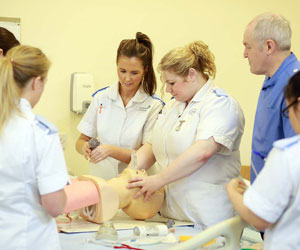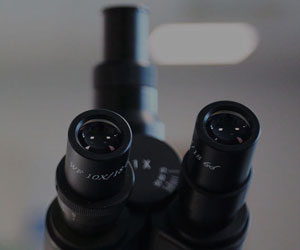Course outline
Course summary
The indicative course content will cover the principles of screening. Complications of Pregnancy - effects upon foetal development / wellbeing Adaptation to extra-uterine life of systems Neonatal physiology, Respiratory, Cardiovascular, Nervous system, Gastrointestinal system, Skeletal, Reproductive, Immunological, Endocrine, Congenital abnormalities, Gestational assessment methods. Procedure and application of practical examination skills
Qualificatory Practice: You will develop the knowledge and understanding to underpin skill development in the clinical area. Clinically based practice will include screening for congenital cardiac defects, developmental dysplasia of the hip, some ocular disorders (including congenital cataract), and undescended testes as well as a general physical examination.
On successful completion of the module you will be able to:
- Critically analyse the principles of screening and the routine newborn and infant physical examination
- Critically analyse the ethical, legal and professional issues underpinning examination of the newborn
- Competently undertake the physical examination of the newborn/6-8 week old infant including screening for congenital abnormalities such as cardiac defects, developmental dysplasia of the hips, ocular disorders (including congenital cataracts) and undescended testes
- Critically analyse how learning from this module has transformed your understanding of your practice.
To complete the practice component of the module, you will:
- Demonstrate achievement of the work-based competencies as detailed in the competence profile
- Identify your own learning needs in liaison with your clinical facilitator
- Demonstrate skill acquisition of the identified clinical and professional skills
- Reflect on your progress in practice
- Explore learning opportunities in relation to your identified learning needs
Indicative core bibliography
- Baston, H. (2017) Examination of the newborn : a practical guide /. Third edition. Edited by H. Durward. London :: Routledge, p. xvii, 248 pages
- Hall, M. (2009) A foundation for neonatal care : a multi-disciplinary guide /. Edited by Michael Hall, A. Noble, and S. Smith. Oxford :: Radcliffe Publishing Ltd.
- Lomax, A. (ed.) (2021) Examination of the newborn : an evidence-based guide . Third edition. Hoboken, NJ, USA :: Wiley Blackwell, p. xvii, 238 pages :
- Lumsden, H. (2010) Care of the newborn by ten teachers. Edited by D. Holmes and H. Lumsden. London :: Hodder Arnold, p. 1 online resource (206 p.).
- Tappero, E.P. and Honeyfield, M.E. (eds.) (2018) Physical assessment of the newborn : a comprehensive approach to the art of physical examination /. Sixth edition. New York, NY :: Springer Publishing Company,.
Modules
Programme Specification
Assessment, Feedback, and Teaching and Learning methods
Timetables
Entry requirements
Entry Requirements
Evidence of prior successful study at underpinning level.
Selection criteria
You must be working in, or have access to, an appropriate practice environment as you will be required to submit a case study based on the examination of an infant. This case study will need to include pertinent history taking/information gathering skills, diagnostic tests (if appropriate) that may be needed, and/or referral pathways, gestational age, physical and developmental assessment; relating these assessment findings to any underlying pathological or physiological changes. The case study must also include family adaptation, and coping skills and an appropriate plan of care/discharge.






